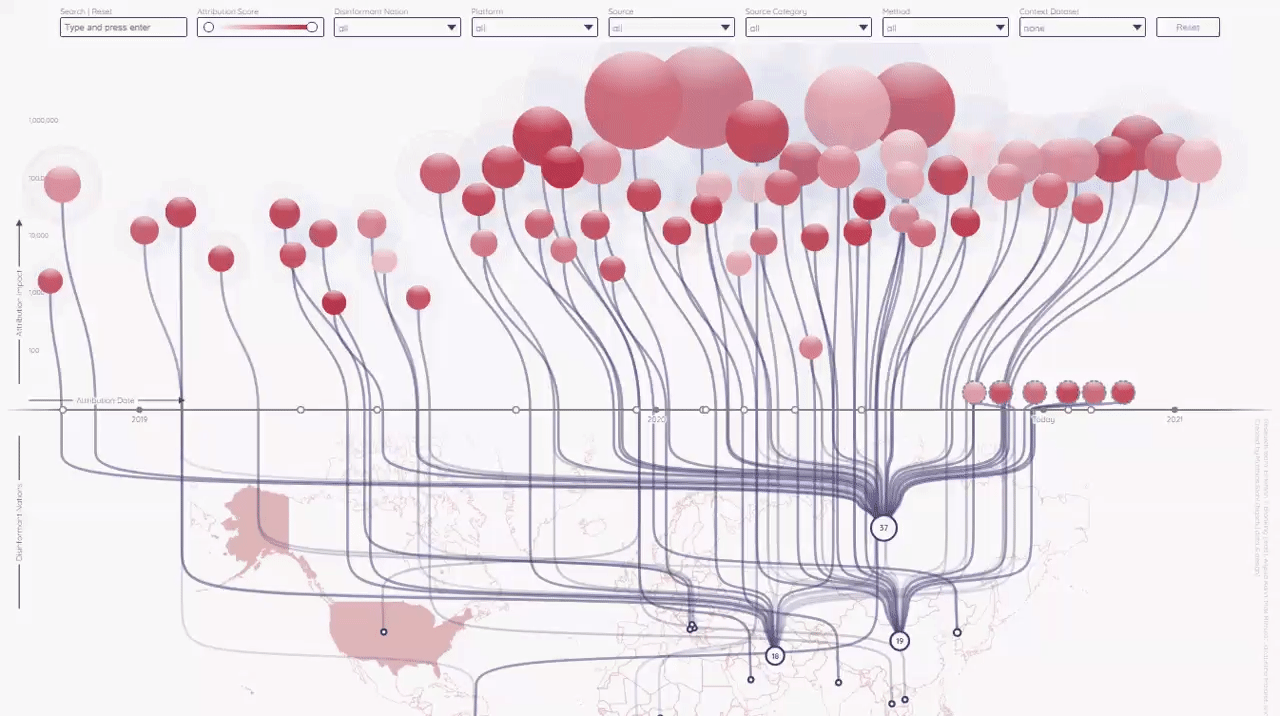Google to Pay Publishers Over $1 Billion for News Content | Russian operation masqueraded as right-wing news site to target US voters | Germany crackdown set to exclude Huawei from 5G rollout


Follow us on Twitter. The Daily Cyber Digest focuses on the topics we work on, including cyber, critical technologies & strategic issues like foreign interference.
Alphabet Inc.’s Google will start paying select media outlets to display curated content on its news app in a concession to the industry which has accused the search engine and other tech giants of unfairly using content for years. Bloomberg
The Russian group accused of meddling in the 2016 U.S. election has posed as an independent news outlet to target right-wing social media users ahead of this year’s vote, two people familiar with an FBI probe into the activity told Reuters. Reuters
Germany is to impose tough new restrictions on telecoms equipment providers which will effectively exclude Huawei from the buildout of the country’s 5G phone networks. An IT security bill that Angela Merkel’s cabinet is planning to pass in the coming weeks would stop short of an outright ban on Huawei but creates bureaucratic obstacles that could prove insurmountable for the Chinese company, according to MPs with knowledge of the draft legislation. Financial Times
ASPI ICPC
Russia trying to spread disinformation about coronavirus vaccines, UK armed forces chief warns
Independent
@theconradduncan
“The Australian Strategic Policy Institute is tracking how a range of actors are manipulating the information environment to exploit the Covid-19 crisis for strategic gain - including pro-Russian vaccine politics whose disinformation narratives are designed to permeate anti-vaccination social media groups.”
The World
Google to Pay Publishers Over $1 Billion for News Content
Bloomberg
@nat_droz
Alphabet Inc.’s Google will start paying select media outlets to display curated content on its news app in a concession to the industry which has accused the search engine and other tech giants of unfairly using content for years.
Australia
Covid-19 highlights our digital divide. Technology is key to better outcomes for Indigenous Australians
The Guardian
Ben Bowen
The digital divide is being highlighted by Covid-19, not only in access to technology and connectivity but also in digital literacy among many of our people. With so many of our family and friends managing chronic diseases it would be great if we could use telehealth in the same way that many others are now. Accessing online training, or interacting with government services, and shopping online is something most of us take for granted.
The US is grappling with tech monopolies, but Australia has problems closer to home - and coronavirus could make it worse
ABC News
@antonyjfunnell
Americans like to think of their country as the land of competition, where success boils down to individual drive and inventiveness - whether you fail or triumph depends solely on your own commitment. Australians hold to a similar notion - the fair go. As Prime Minister Scott Morrison defined it: "If you have a go, you get a go." But analysts suggest both nations are increasingly less encouraging of competition, and that from supermarkets to social media to transport, monopolistic capitalism is on the rise.
Australia to Spend $575M on Tech Including Blockchain to Boost Pandemic Recovery
Coin Desk
@Dan_Z_Palmer
Australian Prime Minister Scott Morrison has announced the federal government has set aside nearly A$800 million (US$575 million) to invest in digital technologies as part of its coronavirus recovery plan.
Why Australia needs an SME cybersecurity ambassador
Security Brief
@Mick Esber
All organisations are vulnerable to cybercrime, but SMEs typically have far fewer resources to protect themselves. That’s why Australia’s Cybersecurity Strategy 2020, which includes assistance to small and medium enterprises (SMEs) to grow and increase their cybersecurity awareness and capabilities, is welcome.


China
Big tech firms may be handing Hong Kong user data to China
The Guardian
@skirchy
Big technology companies may already be complying with secret Chinese requests for user information held in Hong Kong and ought to “come clean” about the vulnerability of the data they hold there, a senior US state department official has said.
In U.S.-China Tech Feud, Taiwan Feels Heat From Both Sides
The New York Times
@zhonggg
The island’s biggest chip maker has been a coveted partner to both battling giants. But rising nationalism is making it harder to keep the middle ground.
USA
Exclusive: Russian operation masqueraded as right-wing news site to target U.S. voters
Reuters
@jc_stubbs
The Russian group accused of meddling in the 2016 U.S. election has posed as an independent news outlet to target right-wing social media users ahead of this year’s vote, two people familiar with an FBI probe into the activity told Reuters.
Misinformation about Biden’s health spreads after debate
The Washington Post
@lizzadwoskin
False stories about Joe Biden’s health continued to spread on social platforms the day after the first presidential debate, including misleading Facebook ads by the Trump campaign and a viral video on TikTok.
Twitter says FBI tip prompted takedown of 130 fake accounts during debate
Cyberscoop
@jwarminsky
Intelligence from the FBI prompted Twitter to take down roughly 130 accounts that “appeared to originate in Iran,” and were trying to generate conflict during the presidential debate Tuesday, the social media company reported.
Study Finds ‘Single Largest Driver’ of Coronavirus Misinformation: Trump
The New York Times
@SherylNYT @noahweiland
Cornell University researchers analyzing 38 million English-language articles about the pandemic found that President Trump was the largest driver of the “infodemic.”
Where Are The Deepfakes In This Presidential Election?
NPR
@timkmak
Deepfake videos haven't been a problem yet in the 2020 presidential race. It's not because they aren't a threat, but because simpler deceptive tactics are still effective at spreading misinformation.
Read ASPI’s report: ‘Weaponised Deep Fakes’ here.
DOD, DHS expose hacking campaign in Russia, Ukraine, India, Malaysia
Cyber Scoop
@shanvav
The Department of Defense and the Department of Homeland Security are calling out an unspecified “sophisticated cyber actor” Thursday for using malware to launch cyberattacks against targets in India, Kazakhstan, Kyrgyzstan, Malaysia, Russia and Ukraine.
Senate panel votes to authorize subpoena targeting Facebook, Google and Twitter executives
The Washington Post
@TonyRomm
A Senate committee voted Thursday to authorize subpoenas that could force the top executives at Facebook, Google and Twitter to testify at an upcoming congressional hearing, escalating lawmakers' war with Silicon Valley over their policies to police content.
Ransomware Victims That Pay Up Could Incur Steep Fines from Uncle Sam
Krebs on Security
@krebsonsecurity
Companies victimized by ransomware and firms that facilitate negotiations with ransomware extortionists could face steep fines from the U.S. federal government if the crooks who profit from the attack are already under economic sanctions, the Treasury Department warned today.


UK
GCHQ discovered 'nationally significant' vulnerability in Huawei equipment
Sky News
@AJMartinSky
Cyber security analysts tasked with investigating Huawei equipment used in the UK's telecommunications networks discovered a "nationally significant" vulnerability last year. Investigators at the UK's Huawei Cyber Security Evaluation Centre (HCSEC) found an issue so severe that it was withheld from the company, according to an oversight report published on Thursday.
Read the full report here.
Chinese students face ban amid security fears
The Times
@LOS_Fisher
Hundreds of Chinese postgraduate students are to be banned from studying sensitive subjects at British universities as ministers toughen entry rules, The Times understands. The Foreign, Commonwealth and Development Office will expand from today the remit of its security vetting for overseas applicants wanting to study subjects relating to national security, amid concerns about the theft of intellectual property.
Europe
Germany crackdown set to exclude Huawei from 5G rollout
Financial Times
Germany is to impose tough new restrictions on telecoms equipment providers which will effectively exclude Huawei from the buildout of the country’s 5G phone networks. An IT security bill that Angela Merkel’s cabinet is planning to pass in the coming weeks would stop short of an outright ban on Huawei but creates bureaucratic obstacles that could prove insurmountable for the Chinese company, according to MPs with knowledge of the draft legislation.
Russia
Russia's Fancy Bear Hackers Likely Penetrated a US Federal Agency
Wired
@Andy Greenberg
A WARNING THAT unidentified hackers broke into an agency of the US federal government and stole its data is troubling enough. But it becomes all the more disturbing when those unidentified intruders are identified - and appear likely to be part of a notorious team of cyberspies working in the service of Russia's military intelligence agency, the GRU.


Africa
Digital democracy is still a long way off in Africa: it takes more than technology
The Conversation
@fromagehomme @LaserGabi
From the mid-2000s onwards, the digital revolution raised hopes of democratic transformation and strengthening in Africa. But it hasn’t quite turned out like that. Now, almost a decade after the “Arab Spring”, techno-optimism has given way to techno-pessimism.
Misc
Facebook will start surfacing some public group discussions in people’s News Feeds and search results
The Verge
@ashleyrcarman
Facebook is expanding the reach of public groups today with new features that could lead to more people engaging in group discussions, but also potentially more visibility for dangerous or nefarious communities. The company announced multiple updates today for Groups that include automating moderation and covering people’s News Feeds with group discussions.
Research
Priorities for a Technology Foreign Policy for India
ORF
@whoknowstrish
On 1 January 2020, the Ministry of External Affairs announced the establishment under its wing of the New, Emerging and Strategic Technologies (NEST) division. This marked a welcome addition to the government’s organisational capacities in an era increasingly being characterised by the interplay of technology, trade, security and geopolitics. This brief outlines the global and domestic context that will surround the operations of the NEST division, and identifies the domains and processes that will demand the NEST division’s immediate attention.
Making sense of foreign interference claims on the eve of the 2020 U.S. election
DFRLab
@DFRLab
As the U.S. presidential election approaches, allegations of foreign interference have risen sharply. These claims have originated from U.S. intelligence agencies, technology companies, as well as political campaigns and senior political appointees serving in the current U.S. administration. According to DFRLab analysis, there have been at least 10 major foreign interference claims made in the month of September alone, each alleging different actors and different methods and objectives. These claims vary widely in their evidence and objectivity. Sometimes, they even contradict each other.


Events


Jobs
Senior Researcher / Project Lead
ASPI ICPC
ASPI’s International Cyber Policy Centre (ICPC) has an outstanding opportunity for a senior researcher to lead a one-year project looking at leadership networks across Asia. Interviews will start immediately.


